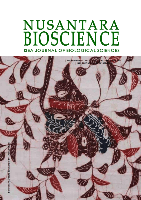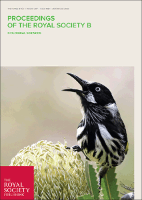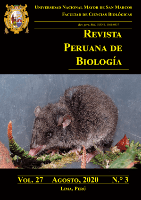
Nusantara Bioscience
Scope & Guideline
Innovating Solutions for Environmental and Public Health
Introduction
Aims and Scopes
- Biodiversity and Conservation:
The journal covers studies on the diversity of flora and fauna, emphasizing conservation strategies for endangered species and ecosystems. - Plant and Agricultural Sciences:
Research on plant biology, including cultivation methods, genetic diversity, and the impact of various treatments on growth and yield. - Ecological Studies and Environmental Science:
Investigations into ecological interactions, habitat characteristics, and environmental impacts on biodiversity. - Phytochemistry and Ethnopharmacology:
Studies exploring the chemical properties of plants and their traditional uses in medicine, including the pharmacological effects of various plant extracts. - Microbiology and Biotechnology:
Research focusing on microbial diversity, their applications in agriculture and medicine, and the development of biotechnological solutions for environmental issues. - Sustainable Practices in Fisheries and Agriculture:
Exploration of sustainable practices in aquaculture and agriculture, assessing their impacts on ecosystems and food security.
Trending and Emerging
- Climate Change and Environmental Impact Studies:
There is an increasing focus on the effects of climate change on biodiversity, agricultural practices, and ecosystem resilience, highlighting the urgency of these issues. - Molecular Biology and Genetic Studies:
An upward trend in research related to molecular identification, genetic diversity, and biotechnological applications signifies a growing interest in understanding the genetic basis of traits in various species. - Sustainable and Organic Farming Practices:
The journal is seeing more studies on sustainable agriculture, including organic farming methods and their benefits for biodiversity and ecosystem health. - Phytochemical Research and Functional Foods:
Research exploring the health benefits of phytochemicals and functional foods derived from local plants is becoming increasingly popular, reflecting a growing interest in nutrition and health. - Water Quality and Aquatic Ecosystems:
An emerging focus on the assessment of water quality and its effects on aquatic biodiversity indicates a rising concern for freshwater ecosystems and sustainable fisheries.
Declining or Waning
- Traditional Medicine Studies:
There has been a noticeable decrease in the number of papers focusing specifically on traditional medicine practices and ethnobotany, indicating a shift towards more empirical, experimental research rather than ethnographic studies. - Invasive Species Research:
Research on invasive species has become less prominent, possibly due to a saturation of studies or a shift towards addressing more pressing ecological issues. - Agricultural Pests and Diseases:
While still relevant, studies specifically targeting agricultural pests and diseases have seen a decline, suggesting that researchers may be focusing more on integrated pest management strategies rather than isolated studies.
Similar Journals

Egyptian Journal of Botany
Pioneering insights in plant biology and crop science.Egyptian Journal of Botany is a premier publication in the field of botanical sciences, encompassing agricultural research, plant biology, and ecology. Published by the NATL INFORMATION DOCUMENTATION CENT, ACAD SCIENTIFIC RESEARCH & TECHNOLOGY in Egypt, this journal has made significant strides since its establishment, now recognized within several prestigious Scopus quartiles including Q3 in Agronomy and Crop Science, and Q3 in Ecology, reflecting its impact and relevance in the scientific community. With an aim to disseminate high-quality research and foster innovation in plant sciences, the journal provides a platform for researchers, professionals, and students alike to share vital findings and advancements. Although it currently operates under traditional access, the wealth of knowledge it offers is pivotal for those engaged in ecological preservation, crop improvement, and biotechnological applications. With its comprehensive scope and evolving reputation, the Egyptian Journal of Botany is poised to remain an influential player in the botanical sciences from 2019 to 2024 and beyond.

PROCEEDINGS OF THE ROYAL SOCIETY B-BIOLOGICAL SCIENCES
Leading the Charge in Biological InnovationPROCEEDINGS OF THE ROYAL SOCIETY B-BIOLOGICAL SCIENCES, published by the esteemed Royal Society, stands as a premier platform for disseminating cutting-edge research in the fields of Biological Sciences. With an impressive impact factor reflective of its high citation rates and scholarly contributions, this journal encompasses a wide array of disciplines, including Agricultural and Biological Sciences, Biochemistry, Genetics and Molecular Biology, Environmental Science, and Immunology and Microbiology, consistently ranking in the Q1 category across these fields. Since its inception in 1946, it has been committed to advancing our understanding of biological systems and informing evidence-based practices. Researchers and academics can submit their work without the Open Access barrier, thereby maintaining the integrity of the disciplinary discourse while providing comprehensive insights. The journal's location in the United Kingdom also positions it at the heart of global scientific innovation, making it a vital resource for professionals and students alike who are eager to explore the latest trends and breakthroughs in the biological sciences.

Bioscience Journal
Connecting minds, cultivating knowledge in biosciences.Bioscience Journal is a premier open-access publication dedicated to advancing research in the field of agricultural and biological sciences. Published by the Universidade Federal de Uberlândia, this journal has been a vital resource for the academic community since its transition to open access in 2001. With the ISSN 1981-3163, it serves as an essential platform for disseminating innovative research findings and methodologies that contribute to the sustainable development of biological resources. As of 2023, it has been categorized in the Q4 quartile in Agricultural and Biological Sciences (miscellaneous) and ranks 152 out of 221 in Scopus, placing it in the 31st percentile. The journal's scope encompasses a wide array of topics that stimulate interdisciplinary discourse and collaboration among researchers, professionals, and students alike. With engaging content and a commitment to accessibility, Bioscience Journal plays a crucial role in fostering scholarly communication and enriching the academic landscape in Brazil and beyond.

Vestnik Tomskogo Gosudarstvennogo Universiteta-Biologiya
Exploring the Frontiers of Biological KnowledgeVestnik Tomskogo Gosudarstvennogo Universiteta-Biologiya is a prominent peer-reviewed journal dedicated to advancing knowledge in the fields of Agricultural and Biological Sciences, Biochemistry, and Environmental Science, published by TOMSKIJ GOSUDARSTVENNYI UNIV in the Russian Federation. With an ISSN of 1998-8591 and an E-ISSN of 2311-2077, this journal serves as a vital platform for researchers to disseminate findings that encompass diverse biological disciplines. Although currently categorized in the fourth quartile across several fields, including Agricultural and Biological Sciences (Q4) and Environmental Science (Q4), the journal is committed to improving its academic impact and visibility. Its publication spectrum includes significant contributions from both local and international scholars, fostering a rich exchange of ideas and research methodologies. Access to the journal’s content is unrestricted, providing valuable resources for students, professionals, and researchers alike. As the journal converges its focus from 2018 to 2024, it aims to enhance its academic stature while contributing rigorously to contemporary biological research.

Insects
Fostering Collaboration in Entomological DiscoveriesInsects is a prominent open-access journal published by MDPI, dedicated to advancing research in the vibrant field of insect science. Since its inception in 2011, this journal has become a vital resource for academics and professionals alike, also ranked in the prestigious Q1 category within the Insect Science field by Scopus, achieving a remarkable rank of 26 out of 181 journals. With an ongoing convergence period from 2010 to 2024, Insects provides comprehensive coverage of various aspects of entomology, including but not limited to ecology, behavior, physiology, and applied entomology. Based in Switzerland, the journal promotes an open-access model, ensuring that vital research is readily available to researchers, practitioners, and students globally. This journal not only facilitates the dissemination of groundbreaking entomological research but also fosters collaboration and interdisciplinary dialogue in the field.

BIOLOGY BULLETIN
Bridging Gaps in Biological Research for Global Impact.BIOLOGY BULLETIN is a prominent academic journal published by PLEIADES PUBLISHING INC, dedicated to advancing the fields of Agricultural and Biological Sciences as well as Biochemistry, Genetics, and Molecular Biology. With an ISSN of 1062-3590 and E-ISSN of 1608-3059, the journal has been a vital resource for researchers and professionals since its commencement in 1996. Located in the United States, BIOLOGY BULLETIN operates within a highly competitive academic landscape, achieving a 2023 ranking in the Q3 quartile for Agricultural and Biological Sciences and Q4 for Biochemistry, Genetics, and Molecular Biology, highlighting its commitment to delivering impactful research despite its challenges. Researchers seeking to publish their findings will find a platform for significant insights, as reflected in its Scopus rankings, where it stands at #183 and #199 out of 221 in its respective categories, showcasing opportunities for growth and visibility. While currently not an open-access publication, BIOLOGY BULLETIN plays a crucial role in facilitating scholarly communication and fostering an understanding of biological sciences, making it an essential read for academics, professionals, and students alike.

BANGLADESH JOURNAL OF BOTANY
Connecting Ecology and Conservation in BotanyBANGLADESH JOURNAL OF BOTANY is a prominent publication in the field of plant sciences, dedicated to advancing research and knowledge within the botanical community. Published by the BANGLADESH BOTANICAL SOC, this journal serves as a vital platform for researchers and scholars seeking to disseminate their findings related to plant biology, ecology, and conservation practices, particularly within the unique context of Bangladesh's diverse flora. With an ISSN of 0253-5416 and an E-ISSN of 2079-9926, the journal encompasses a wide scope of topics, reflecting interdisciplinary approaches in botanical research. Since its inception, with convergence periods from 1996 to 2001 and from 2003 to 2024, it has garnered recognition, positioned in the Q4 category in the Plant Science field with a ranking of #459/516 in Scopus, indicating its contribution to the field despite its developing impact. Operating within Bangladesh, at the UNIV DACCA DEPT BOTANY, the journal provides a crucial insight into the ecological and agricultural implications of plant studies in the region, catering to the needs of academics, professionals, and students eager to engage with contemporary botanical research.

PERIODICUM BIOLOGORUM
Empowering Researchers Through Quality ScholarshipPERIODICUM BIOLOGORUM is a well-established interdisciplinary journal published in Croatia that focuses on advancing the fields of agricultural and biological sciences, biochemistry, genetics, and molecular biology, along with general medicine. With its roots dating back to 1980, the journal has been an essential platform for the dissemination of original research, reviews, and theoretical studies, fostering collaboration and dialogue among researchers within these diverse areas. While currently holding a Q4 quartile ranking in several categories, including agricultural and biological sciences, biochemistry, and general medicine, it provides a significant opportunity for authors seeking to contribute to the body of knowledge in these sectors. Although Open Access options are not available, the journal's rich history and commitment to quality scholarship make it a valuable resource for professionals, researchers, and students alike, aiming to stay informed about current trends and advancements in biological research and its applications.

REVISTA PERUANA DE BIOLOGIA
Empowering Minds with Cutting-Edge Biological InsightsREVISTA PERUANA DE BIOLOGIA, an esteemed journal published by the Universidad Nacional Mayor de San Marcos, Faculty of Biological Sciences, has been a vital platform for disseminating significant biological research since its inception in 1974. With an Open Access model, this journal ensures that high-quality research is freely available to readers across the globe, fostering the advancement of knowledge within the field of agricultural and biological sciences. Despite proprietary challenges, the journal has secured a respectable Q3 category ranking in Agricultural and Biological Sciences and currently holds a 137th rank in Scopus among its peers. By embracing a comprehensive scope, REVISTA PERUANA DE BIOLOGIA encourages submissions that contribute to diverse biological topics, making it an essential resource for researchers, professionals, and students looking to enhance their understanding and expertise. With its ongoing commitment to excellence, this journal remains a cornerstone of biological research in Peru and beyond, reinforcing the importance of collaboration and knowledge sharing in the scientific community.

GENETICS AND MOLECULAR BIOLOGY
Bridging theory and practice in genetic science.GENETICS AND MOLECULAR BIOLOGY, published by the SOC BRASIL GENETICA, is a prominent journal dedicated to the advancement of knowledge in the fields of genetics and molecular biology. Since its inception in 1998, this Open Access journal has served as a vital platform for researchers, professionals, and students to disseminate their findings and engage with the latest innovations and discoveries. With an impact factor that reflects its growing influence, GENETICS AND MOLECULAR BIOLOGY ranks in the Q3 category for both genetics and molecular biology as of 2023, indicating its position within the academic community. The journal is indexed in Scopus, highlighting its commitment to maintaining rigorous peer-review standards while providing wide-reaching access to quality research. Operating out of Ribeirão Preto, Brazil, it fosters a collaborative environment for academic discourse and research development not only in Brazil but also globally. The journal encourages submissions that explore a wide range of topics in genetics and molecular biology, making it an essential resource for anyone involved in these dynamic fields.